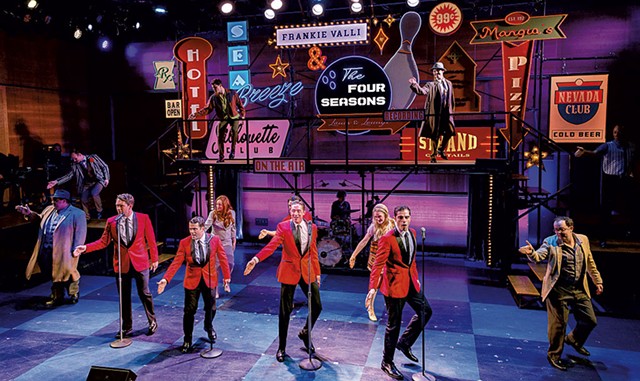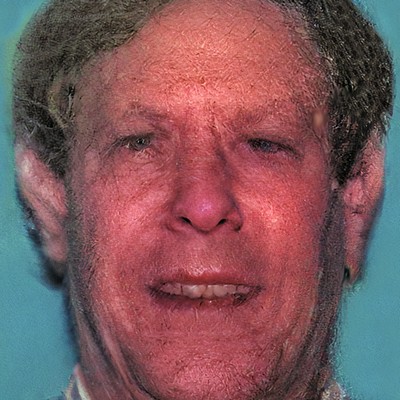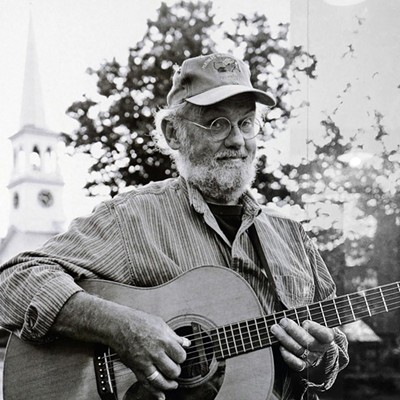
- Courtesy Of Hubert Schriebl
- The cast of Jersey Boys
Before they would harmonize in matching suits, the members of the Four Seasons faced their limited prospects on New Jersey's mean streets. Using sharp narrative techniques, Jersey Boys tells the story of Frankie Valli finding his sweet voice among tough guys in the late 1950s. Weston Theater Company's production of the 2006 Tony Award winner for Best Musical is nonstop entertainment.
The intensity needed to reach — and later lose — a place in the Top 40 gives Jersey Boys a propulsive plot, however well worn. The script uses a documentary style, and though songs dominate the show, the history of the band is told with crisp vignettes and smart, snappy dialogue. The book by Marshall Brickman and Rick Elice is much more than an excuse to play the hits. They structure the show in four parts, letting each band member tell the group's rags-to-riches story.
We meet tough and touchy spark plug Tommy DeVito (a strong JP Qualters), the band's rule-breaking leader, whose criminal past and dangerous financial choices undermine his control of the group. Tommy doesn't so much discover lead singer Frankie Valli (Adam Marino, an earnest dynamo) as accept his inevitability.
Valli has a lot to learn about developing his sound, but when he perfects it, songsmith Bob Gaudio (Aidan Cole, goodest of good guys) realizes he's destined to write for that voice. Bob sings and reels out hit melodies. Anchoring the songs is bass Nick Massi (William Spinnato, a droll delight), who never complains about his lower dose of the limelight.
Valli seeks fame but sidles up to it with the aw-shucks temperament of a kid with a curfew who's planning to be a barber. He shoulders the hard work of touring, and between his talent, Nick's good nature and Bob's hit-writing gift, the band stays together through some messy times. But it does get messier, and the Act 2 comeback has real suspense, provided you don't read ahead in the program's song list to see what's coming.
In two and a half hours, the audience hears 32 songs, a '60s flashback in music and manners. The melodies are still strong enough to grab and not let go. "Sherry," with its three-syllable wail of the name, is eternally infectious and, we learn, dashed off by Bob. "Big Girls Don't Cry" and "Walk Like a Man" stomp out their messages until listeners tap their toes along.
This production pulls out all the stops on 1967's "Can't Take My Eyes Off You," the lounge ballad with a stunning tempo twist. Marino's performance of the song is a highlight.
Most tunes are staged as if we're watching a recording session or performance, but sometimes they underscore the story. "Fallen Angel" accompanies Frankie's grief, "Beggin'" illustrates the band's connection to the mafia, and "December 1963 (Oh, What a Night)" echoes Bob's own memorable evening.
Any jukebox musical starts with the doomed mission of giving the audience a perfect replica of the bygone artists. A little weak spot is usually present, and it's up to the energy of the performers and the dazzle of the director to convince us to ignore it. Here, the limitation is a lack of power in Marino's falsetto, but Weston's production positively glows with show business glitter, and we don't need to linger on any flaw. The punch of "Rag Doll" to the rescue!
Dozens of smaller characters, all played by a nimble cast of nine, give solidity to the anecdotal storytelling. These multiple-role players sing, dance and portray everyone from a courtly mob boss to hanger-on Joe Pesci (yes, that one).
To keep this musical train moving, the writers limit dramatic narrative to headline news. The turmoil in Frankie's first marriage must be inferred from the briefest argument in marital history, and deep emotions are mentioned, not plumbed. The economy of storytelling is exuberant, distilling events to a gesture or a wisecrack. We can conclude that a record producer is an anxiety-riddled mastermind because he's served a royal glass of milk by a minion dressed to score his boss' salacious look. The speed of the story creates the power of the story.
Director John Simpkins marshals these quick scenes like a baker throwing in extra chocolate chips. He makes the show pure fun, down to Tommy's perp walk to jail, played like an entertaining flourish of choreography. Simpkins creates atmospheric texture from anything at hand, such as having a waiter slouch in the background with a cigarette, listening to the band's last song at a club. Above all, he orchestrates the rise to fame, and the crash that follows, as a high-velocity escapade.
Weston's production has an effortless excellence that invites the audience to bask in the music and story while fine theatrical craft adds subtle impact. The costumes deliver both splendor and storytelling, from the perfect satin jacket lapels to a catalog of cool in Jersey streetwear. The back wall of the set is filled with period signage in a salute to the era that becomes a map of the band's world, each sign illuminating to indicate a scene location.
A five-member band produces all the show's musical styles, including the Four Seasons' progress toward their own sound and an opening act, the Angels, powering through "My Boyfriend's Back." The choreography keeps the singers in gorgeous physical unison, brimming with big gestures, shimmy legs, heel stomps and workin'-it arm pumps.
Three-part harmony wrapped around a bright falsetto is an expressive musical formula, and the catchy tunes trigger both nostalgia and joy. This production can entertain anyone who surrenders to showmanship, though baby boomers are the target audience. Want to feel young again, or revel in a different era? Jersey Boys has the hustle and heart to send you swaying back in time.





Comments
Comments are closed.
From 2014-2020, Seven Days allowed readers to comment on all stories posted on our website. While we've appreciated the suggestions and insights, right now Seven Days is prioritizing our core mission — producing high-quality, responsible local journalism — over moderating online debates between readers.
To criticize, correct or praise our reporting, please send us a letter to the editor or send us a tip. We’ll check it out and report the results.
Online comments may return when we have better tech tools for managing them. Thanks for reading.